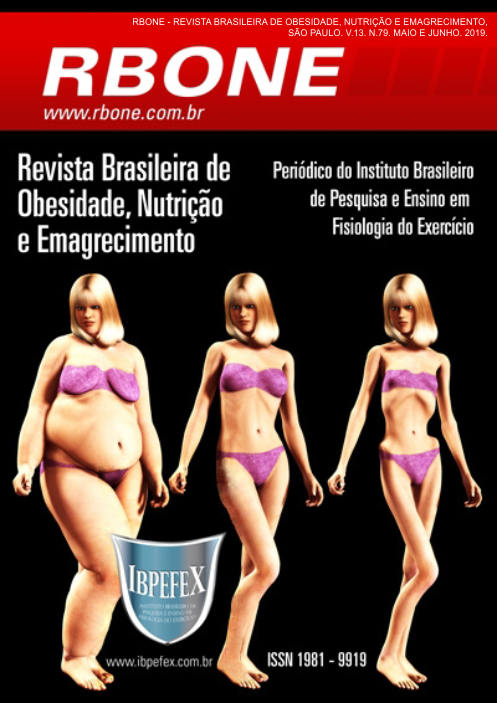Prevalence of signals and symptoms of intestinal disbiosis in obese individuals attended at an institution of education in BrasÃlia-DF
Abstract
Objective: To investigate the prevalence of signs and symptoms of intestinal dysbiosis among obese patients attended at an outpatient setting in a teaching institution in Brasília-DF. Methods: Descriptive cross-sectional study. The data were collected through the Metabolic Screening Questionnaire in 30 patients diagnosed with Obesity (Body Mass Index> or = 30.0), living in Brasilia and surroundings, of both sexes, aged between 20 and 55 years. Results: There was a high prevalence of hypersensitivity in the subjects investigated (57%) and signs and symptoms of intestinal dysbiosis in 17% of the cases. The most frequent symptoms were: Eructation and Flatulence, in 70% of the sample; Heartburn, 70%; Abdominal distention in 53%; Diarrhea, 43% and Stomach Pain, in 43% of the investigated subjects. Conclusions: The present study indicated a prevalence of signs and symptoms of intestinal dysbiosis in 17% of the patients investigated. Therefore, it is recommended more intervention strategies by professionals, such as: consumption of a more Mediterranean and less westernized diet, the practice of physical activity, the creation of specific foods that work the gastrointestinal microbioma in order to favor a nutritional state.
References
-Almeida, L.; Marinho, C.; Souza, C.; Cheib, V. Disbiose Intestinal. Rev Bras Nutr Clin. Vol. 24. Num. 1. 2009. p. 58-65.
-Castillo, V.; Sanhueza, E.; Mcnerney, E.; Onate, S.; Garcia, A. Microbiota dysbiosis: a new piece in the understanding of the carcinogenesis puzzle. Journal of Medical Microbiology. Vol. 65. 2016. p. 1347-1362.
-Galdino, J.; Oselame, G.; Oselame, C.; Neves, E. Questionário de rastreamento metabólico voltado a disbiose intestinal em profissionais de enfermagem. Revista Brasileira de Obesidade, Nutrição e Emagrecimento. São Paulo. Vol. 10. Num. 57. 2016. p. 117-122. Disponível em: <http://www.rbone.com.br/index.php/rbone/article/view/422/>
-Kelishadi, R.; Farajian, S.; Safavi, M.; Mirlohi, M.; Hashemipour, M. A randomized triple-masked controlled trial on the effects of synbiotics on inflammation markers in overweight children. J Pediatr. Vol. 90. 2014. p. 161-168.
-Ministério da Saúde. Secretaria de Atenção à Saúde. Departamento de Atenção Básica. Institui estratégias para o cuidado da pessoa com doença crônica: obesidade. Cadernos de Atenção Básica. Num. 38. Brasília. 2014.
-Mitsou, E.; Kakali, A.; Antonopoulou, S.; Mountzouris, K.; Yannakoulia, M.; Panagiotakos, D.; Kyriacou, A. Adherence to the Mediterranean diet is associated with the gut microbiota pattern and gastrointestinal characteristics in an adult population. British Journal of Nutrition. Vol. 117. 2017. p. 1645-1655.
-Moraes, A.; Silva, I.; Pititto, B.; Ferreira, S. Microbiota intestinal e risco cardiometabólico: mecanismos e modulação dietética. Arq Bras Endocrinol Metab. Vol. 58. Num. 4. 2014. p. 317-327.
-O’Connor, S.; Castonguay, S.; Gagnon, C.; Rudkowska, I. Prebiotics in the management of components of the metabolic syndrome. Vol. S0378-5122. Num. 17. 2017. p. 30687-30684.
-Oliveira, A. M.; Hammes, T.O. Microbiota e barreira intestinal: implicações para a obesidade. Clin Biomed Res. Vol. 36. Num. 4. 2016. p. 222-229.
-Passos, M.; Moraes-filho, J. Intestinal microbiota in digestive diseases. Arq Gastroenterol. Vol. 54. Num. 3. 2017. p. 255-262.
-Tomasello, G.; Mazzola, M.; Leone, A.; Sinagra, E.; Zummo, G.; Farina, F.; Damiani, P.; Cappello, F.; Geagea, A.; Jurjus, A.; Assi, T; Messina, M.; Carini, F. Nutrition, oxidative stress and intestinal dysbiosis: Influence of diet on gut microbiota in inflammatory bowel diseases. Biomed Pap Med Fac Univ Palacky Olomouc Czech Repub. Vol. 160. Num. 4. 2016. p. 461-466.
-Vandenplas, Y.; Huys, G.; Daube, G. Probiotics: an update. J Pediatr. Rio J. Vol. 91. Num. 1. 2015. p. 6-21.
Authors who publish in this journal agree to the following terms:
- Authors retain the copyright and grant the journal the right of first publication, with work simultaneously licensed under the Creative Commons Attribution License BY-NC which allows the sharing of the work with acknowledgment of the authorship of the work and initial publication in this journal.
- Authors are authorized to enter into additional contracts separately for non-exclusive distribution of the version of the work published in this journal (eg, publishing in institutional repository or book chapter), with acknowledgment of authorship and initial publication in this journal.
- Authors are allowed and encouraged to post and distribute their work online (eg, in institutional repositories or on their personal page) at any point before or during the editorial process, as this can bring about productive change as well as increase impact and impact. citation of published work (See The Effect of Free Access).






